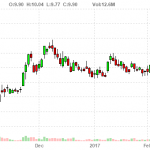Tumultuous swings overnight almost exceeded the Monday carnage; and certainly were wilder in terms of directional shifts than anything else seen. That of course resulted from the collapse of the XIV, by 90%. It was 1929 for the crowd we warned that constantly poured money into selling volatility.

So XIV was halted along with ‘all’ futures contracts in Asia at one point; and that calmed things a bit. It also was halted multiple times Tuesday during NYSE hours. You had an overnight rebound in the S&P; and after another morning quick purge, you got a Tuesday turnaround (our normal preferred pattern); but it wasn’t that simple; and even the Dow Industrial Average traversed more than 1000 points in Tuesday’s first hour.
Markets have been wounded; but there is not a systemic danger for now (which doesn’t mean markets can’t bounce around and work lower over a period of time); but does mean this won’t be an immediate financial or other system crisis requiring the Plunge Protection Team or similar Fed interventions to stabilize matters. An orderly progressive decline is fine.
Many stocks (Apple (AAPL) is one key issue to monitor) are below their 200-day Moving Averages; and many more in various states of correction. Might even be notable to observe which stocks are little changed by all this (a sign of reduced risk in some cases). Crude Oil stabilized (still in the mid 60’s by the way); and the XOI (oil stocks) stopped plummeting; that was very important to the market as well.

The economy and Nation are strengthening; and market structural issue concerns are not new. The issues of ‘risk’ arising from ‘passive investing’ are not new; and Carl Icahn is correct about that, even if dismissed as a self-interest perspective by media commentators. I agree not because of his disdain for ‘groups’ that can swing an individual stock regardless of a good or bad fundamental backdrop for the individual company; but since he is correct. (He doesn’t like his investments rocked by things; I’m just referring to the impact focusing on Indexes and ETFs has; so I concur.)














Leave A Comment